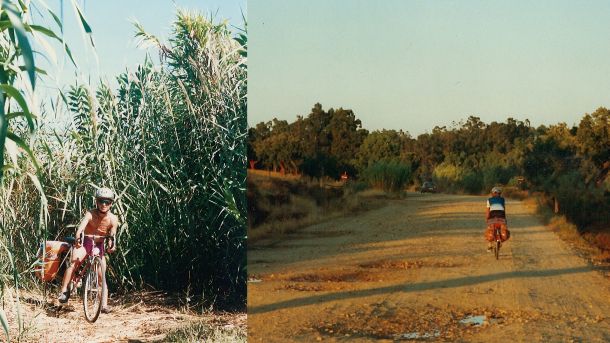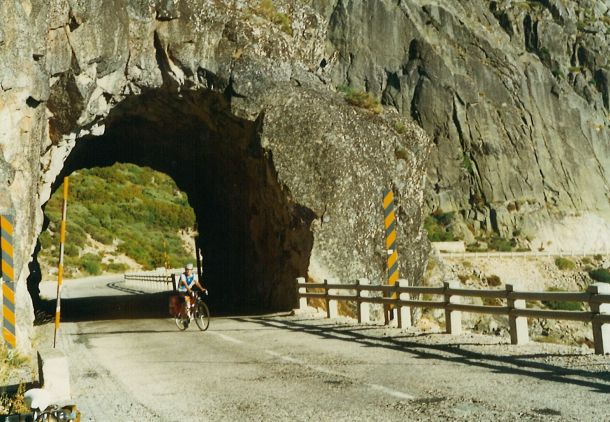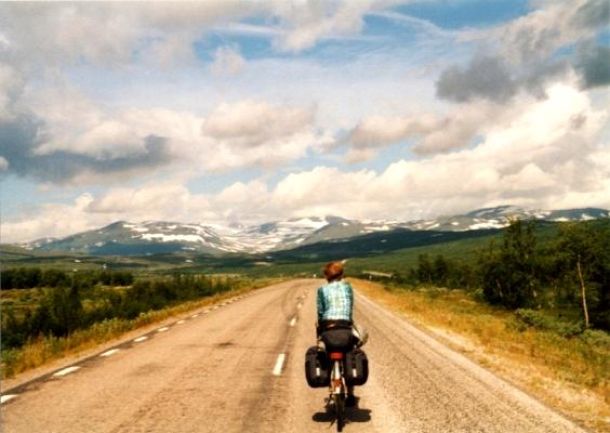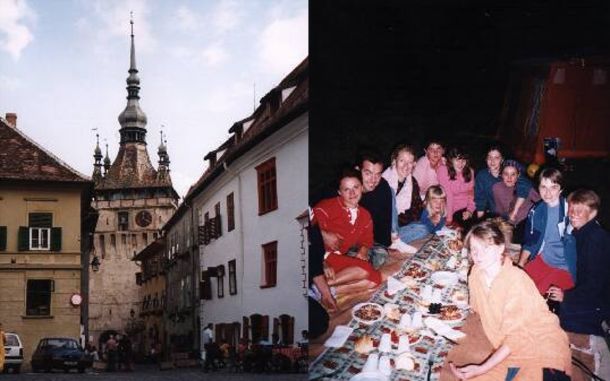Great Britain `98
We are deciding where to go this year. Last year's bath in the Atlantic, on the coast of western Brittany was excellent. We just shouldn't have dragged those awful, bloated, warm feather sleeping bags with us. And we had to pack a proper map of Germany. Germany is only a short distance from the map of France and it is difficult to find a way without a map. Even when the sun is shining and lichen is growing on the trees. That's the only way we managed to do it in Přimda to the pub. They almost locked her in front of us. And the next day to work.
What about Britain, Jarda sent us a detailed car atlas, we also have an invitation from him, I dusted the wheels, the chains are new, the tires are also. Scotland is said to be wonderful. We buy light sleeping bags for twenty marks, that's a different package. Dads are crammed into the bagels. As soon as dear parents will have after the golden wedding we can leave.
The bus, with luggage and wheels in boxes, dropped us off at Victoria Coach Station in the middle of London. All that was left was to fold our skeletons on the spot and go to see my friend Jarda all over the metropolis. Jarka and I have already traveled to many cities, Lisbon, Paris, Nuremberg, we have not yet driven to the left. So, we drive to the right, and preference is given to the right, here it will probably be the other way around.
I prefer everyone, but after a while I realize, especially when everyone on the left says that it will not be a fear of us, but the priority is probably really given from the right. Sometimes we cut the crossroads in the opposite direction, but those who, strangely enough, do not look like rivals against us, but rather laugh, mouth to ear. Well, it's like that, another region, another morality. We prefer to try it with Hyde Park, but Keningston Park follows, where cyclists are forbidden to enter. Rather than going around it again, we'd rather throw ourselves into the vortex of the big city.
It is interesting that even in the city you can orient yourself according to the sun. If it weren't for the fact that I was a little confused by the shape of the intersection, which on the map looked exactly like the one we have to turn to Ashford on, we hit the first time. Jarda provides us with the necessary information about the weather, recommends what to visit, we get advice on where to go with Ashford: on the third "randebaut" to the right ..., and the next day, quite early in the morning (at least on us) we set off.
After a while, we don't know how many "randebaut" we have already passed, we intertwine with the heavy traffic of the London suburbs and head north. We avoid the main roads, but somewhere behind Luton (Vauxhall) we avoided them so much that the road ended and only a narrow path led on. Nevertheless, we did not lose direction and we hit directly to Cambridge. A beautiful city from which history and education breathe on us. We find it just a little strange that cows graze cheekily in the middle of the park.
England is for the most part a pancake on which the wind has nothing to stop. It still blows, mostly at an angle from the front, to the left. I'm almost losing my water bottle on the bridge over the Humber. She dragged herself out of her bed and the wind rolled her to the edge of the bridge, where she caught on a pillar of railings. Well, not much would have happened if it hadn't fallen on someone's head, but I've been dragging water with me for quite a few tens of kilometers. The first larger hills, which are already costing us a lot of effort, are being conquered in the North York Moors. These are no high mountains, the highest "mountain" is not even 400 m, but which way do the cursed English people lead the roads ?!
Sheep run freely along the roads, in fact on the roads. Starts to rain. We pack ourselves in bicycle raincoats, but the wind blows with us. Jarka straightens her raincoat after herself, loses her balance and disappears among the heather. She didn't fall, only I have to do something not to get off the bike too - laughs. It's getting cold and we're going down the valley so fast. It surprises me how fast a bike can develop in a steep descent. Especially when I want to stop. We take refuge in the train room, make soup and coffee. Meanwhile, one train passes there, the other back.
It stops raining and we can continue. For the first time we encounter a brand of dangerous rise and fall of 20%. For my lightest 32-22 transmission, it can take a long time with a full load. In the evening, in Yarm, we pass the historic station of the first railroad from Stockton to Darlington. Too bad it's dark for the photo shoot. We meet countless attractions along the way, Hadrian's Wall is one of them. Scotland is approaching. We sleep a short distance from the border, in the place shown to us by the housekeeper from a nearby farm. In the morning, the children who are still on holiday will get up so they can say goodbye to us.
After a week of traveling from London and a cold night in Edinburgh, we decide to avoid Perth in the late afternoon in the town of Kinross and to cross the Ochil Hills for almost five hundred meters. Experience tells us not to underestimate the hills, even at the lowest altitude. A few miles is enough for Jarek to have enough (and so do I). The meadows are again wired up to the road, so we gratefully use the slab in an abandoned quarry to rest. We strengthen ourselves with an orange and move on.
From the northwest, the sky is clouded with menacing looking clouds, it is already raining on the horizon. So we should camp as soon as possible so that we have somewhere to hide. That is probably not possible - there is no slice everywhere in the pasture itself. Jarka laments that she won't survive another cold night (she means figuratively of course ..., I hope). Look, there's an abandoned house and a lawn in front of us where you could sleep. However, as we come closer, it is more than obvious that the house is inhabited.
With the idea of ominous clouds, I agree that we will ask about the possibility of setting up a tent. After the bell rings, a young lady, watched by her husband, opens us, obviously with distrust. Surprisingly, they do not oppose our request and show where we can set up a tent. We have to go wash, put our bikes in the shed and if we don't have dinner with them. It is only later that we learn that the young lady, Fiona, a teacher from Perth, is preparing her first dinner for the guests who are just waiting and is a little nervous about it. We are a little hesitant if we are to abuse hospitality so much, but the vision of sitting in the heat will overwhelm us.
After a while, the guests arrive: the couple, the doctor, the university teacher, who have their country house nearby and mowed the grass around our house on holiday. Dinner - stewed mutton, stewed cabbage, carrots, peas, boiled and baked potatoes, baked dessert with ice cream, coffee, good wine, what more could you want. We never suffer from hunger on our travels, but it's hard to keep such a hearty dinner on the stove. Raindrops drum in the window panes during dinner. It was just one of many short, not-so-heavy showers.
After the meal we move to the room. We learn that they bought the house only recently, there are a lot of repairs waiting for them. We look at the house, it really doesn't look its best. Plasterboard above the windows testifies to the recent heavy flow, sagging ceilings of insufficiently dimensioned beams.
Chris and Fiona are climbers and show photos from alpine climbs. Chris says he has all three thousand (!?) in Britain. Everyone is obviously amused by our surprise - the altitude is in the footsteps. Chris pulls out an age map on which all such peaks are clearly marked. Today I don't remember how many of those three thousand there actually are, but there were definitely a lot of them. We ask what places we would recommend to visit us as nature lovers. He talks about Ben Nevis, Britain's highest peak, the poems of the Hebrides, the beauties of the Isle of Skye.
I sit on the floor and draw a map of our next journey. I ask Chris if I made a good choice and we promise to send them a cham card from the north. The fun is starting to get tired, everyone is obviously tired, Fiona's new school year is starting tomorrow, Chris and the guests also have to go to work. We get up to finally (shortly before midnight) set up a tent. We are reassured that we can sleep in the bedroom and, if we want, we can take a bath.
Hygiene is always a bit of a problem on our travels, especially in cold Britain, so we definitely do not reject the offered option and we delight into a bath full of warm water. We sleep as if he threw us into the water and we are about to leave early in the morning.
Fiona is preparing breakfast for us, and to our surprise, a somewhat rumpled Chris, whom we thought was long overdue, stumbles after a while. He wasn't, he made it a little evening. We set out on a journey, in the distance I immortalize the homes of our benefactors.
We climb the hills again and after a while we take off our windbreakers, we start to get hot. I pack the tops in bags and Jarka goes first. I'm slowly catching up with her in a settlement, I don't even follow where I'm going. The road turns south, for a long, long time we descend from the hills to the valley.
Somehow I don't think so. No signpost to read where we are. There are signposts at the next crossroads, but I can't find any of the listed destinations on the map. We cross the highway and enter a small town. Lady, when we go shopping, we ask where we are. He's sputtering a name, but it doesn't tell me anything. I'm suggesting she show me the place on the map. He stares at the map and still points to the lower, folded edge. So I take the map out of the map, spread it out and show it triumphantly to Kinross and invite us for coffee.
With thanks we refuse, the mood is at freezing. Damn, we were here yesterday afternoon. "Look over that grass in the garden, I noticed that yesterday." Jarka says. I remember there was some wandering in the Path of Condie tonight. We did not pay attention to the attention it definitely deserved. But what, we're not going back to the hills, so we'll take it through Perth. In the afternoon we can be where we planned to be long before noon. So to the saddles.
We drive through the beautiful valley of Glen Almond and to avoid traffic as much as possible, over a terrible climb from Glen Quaich we head to Loch Tay. From the east bank of the magical Loch Rannoch we look out the majestic Ben Nevis - the highest mountain in Great Britain (as the vocabulary says: peak at 1343 m above sea level, part of the Grampiana Mountains, annual rainfall of more than 4000 mm, frequented by tourists). We know that the journey ends here, even for bicycles, and we take the train from Rannoch Station. We get water at the station, we ask in disbelief why it's so brown. It's from peat bogs, it's not different, we say we can drink it, everyone drinks it here.
By train, for ten pounds, we move 27 miles further to Tulloch Station, the road to Fort Wiliam. We arrive there in the evening, after beautiful weather there is a sentence, it pours like a can. We walk around the city and wonder if we have to buy warm jackets for cheap money, which the merchants pulled out of the warehouses in this extremely cold summer. The offer is tempting, but we will stuff it, we will not buy anything.
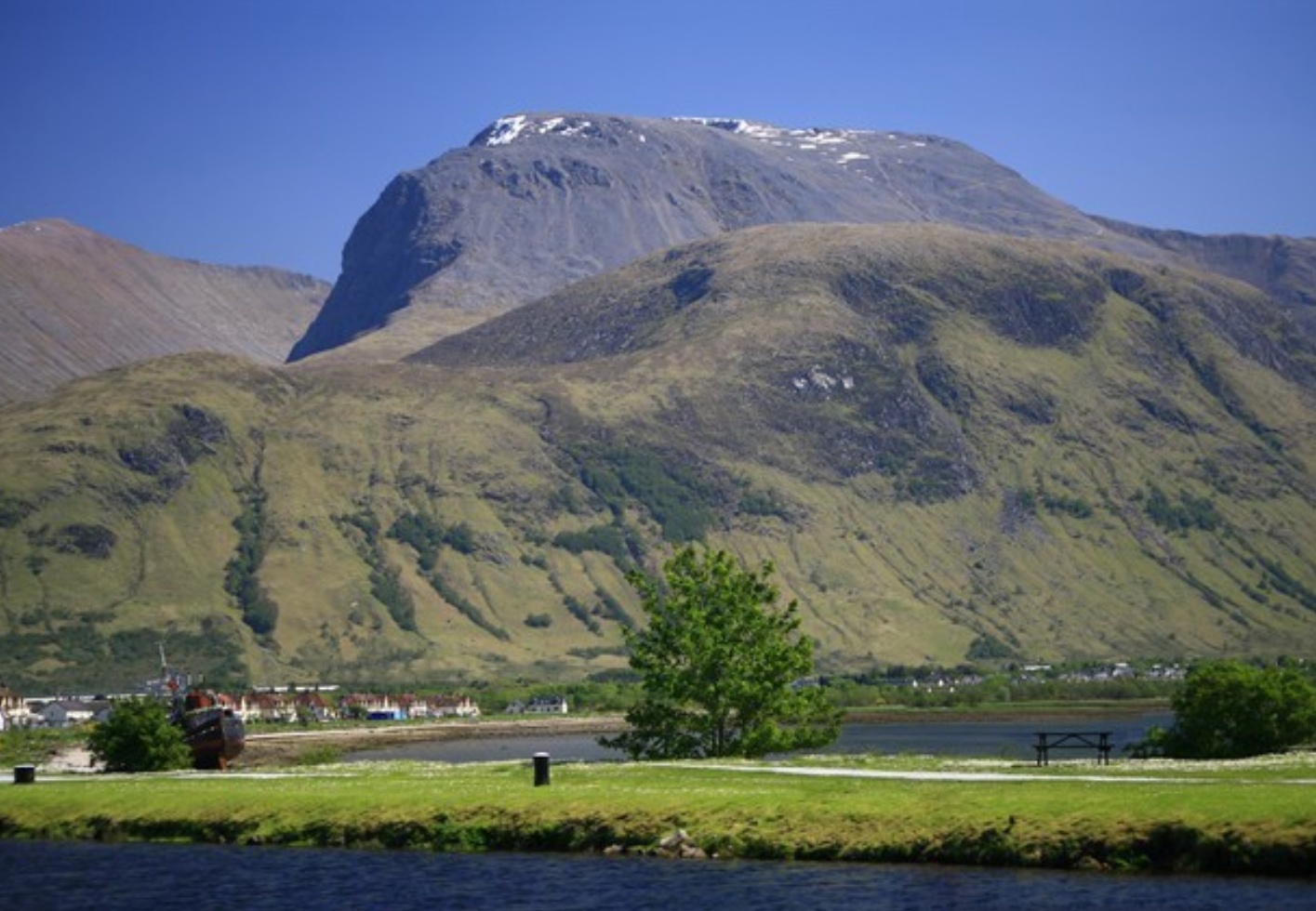
We lie down by the river, a short distance from the road on the way to the foot of Ben Nevis. In the morning it is warm, cold, the fog is rolling down the hillside, but we are still on our way. We lock our bikes in the shed on the farm, we take some snacks, a camera and bicycle raincoats. I will exchange my cycling shoes for trampled boots. Along the way, we pass several groups of tourists who, looking at my shoes, express my health concerns. Around 900 m above sea level it twitches and begins to rain. The view narrowed to a few meters. We are wet on top and inside, sweat just pours out of us. At the top we change into dry clothes, light up ourselves, make a top photo from which nothing can be and still descend. It took us about 3 and a half hours. It's still raining - what now. We cook lunch on the terrace of the information center and wait for the rain to stop a bit. I use a dryer on the toilets and let a stream of hot air blow under the windbreaker.
We pay the entrance fee and look at the exhibition about the famous mountain. We learn that at the beginning of the century there was a meteorological station at the top, where cargo was transported by mules, that there was still snow at the top in the 1960s, that every year, if I remember correctly, the traditional Fort Wiliam run is held in September. Ben Nevis and back, where runners run off the road and jump like chamois from stone to stone. It finally stops raining. Get out of here or we'll never dry again. By the way - wet boots dry up just before London. And it stinks terribly.
It's late at night, it's getting dark fast, the shops are closed and we have nothing to eat. Jarka leaves it calm and he's right. We cross the Caledonian Canal and replenish supplies in the nearest settlement in peace. It's almost dark behind Loch Eil. We look around and a surprise awaits us. The massive peak of Ben Nevis can be seen beautifully illuminated by the setting sun. Where we just lay our heads. On the left is a swamp full of flies, on the right a fenced forest. After a few kilometers we come across the first open entrance to the forest. We are building a tent right by the road in a place probably prepared for a wood dump. Now no one will go to drive us out.
Another quiet night, in the morning we spread butter and flies on the bread again, drink strong, nutritious fly coffee, greet the forester and the woman who take the children to school. We arrive on the west coast and from a distance I hear the sound of a steam locomotive. I try to catch up with her and take a picture of the grandchildren in memory from a convenient angle. It's not working. Maybe next time. It is only a short distance to Mallaig, the port from which boats depart for the islands.
Hebrides, English - as the scientific dictionary states - Western Islands, 7285 km2, a group of about 500 British islands and reefs off the northwest coast of Scotland. It is divided into the Outer Hebrides (Lewis and Uist) and the Inner Hebrides (Skye and Mull). Cold humid climate, sheep farming, fishing and bird hunting, part of Scotland.
We get coffee from a vending machine, we buy tickets to Skay (bikes are transported free of charge) and we still drive through the city. A moment before boarding, a boy and a girl arrive in tandem. From the boat there is a beautiful view of the smaller islands in the southwest and the steep peaks of the island of Skay. The peaks of the mountains only slightly exceed a thousand meters, but they rise almost from the sea, so their appearance is downright impressive. After landing in Armadale, we get on and set off.
Jarka put everything she had with her at sea and now she is gradually taking it off. In the meantime, we are always overtaken by a couple in tandem. Along the way, we exchange a few courtesy formulas. They can be seen in a hurry. in Broadford, just like they buy stock for the evening. They are Italians, they ask us how long we have been on the islands, they arrived a few days ago and they have Mull Island behind them. They say that traveling the islands, whether by bike or on foot, is a popular holiday pastime for young people from all over Europe.
The girl is wearing a down jacket, but she has bare legs and sneakers without socks. He knocks like a rat, I wonder why he doesn't get dressed. He probably doesn't want to linger. They tie the bread with a rubber band to the bagel, still boasting bagpipes, which, carefully wrapped, are carried by the young man and disappeared into the distance. We are a little late packing, but after a few kilometers we have them again. They step on their lives, the boy has a drop of sweat on his nose. However, we are hungry, so we wave to greet them and go down to the grass to eat something. Again, the obligatory fly spread, but in the evening the monsters are unbearable. We get up and go into the dark, hoping to have somewhere to lay our heads again. However, the road starts to climb steeply, so we give up at the top of the climb and set up a tent just below the road.
Early in the morning, at about eight o'clock, some good guy wakes us up by honking. Despite the unpleasant awakening, however, it turned out to our satisfaction all day long. A strong wind blows, but the sun warms beautifully. During the day we travel through Bracadale, Dunvegan and Portree most of the island. We will not go to the northern part of the island, maybe someday .... We spend the second night on the island at the upper end of Glen Varragill with a beautiful view of the Cuillin Hills and the next day we leave this pearl between the islands via Skye Bridge in Kileakin. ).
For beautiful panoramas we drive a few kilometers along Loch Alsh, but then over the saddle Beinn Raimh we descend to Loch Carron. On the way we will be entertained by the sign STROME FERRY - NO FERRY.
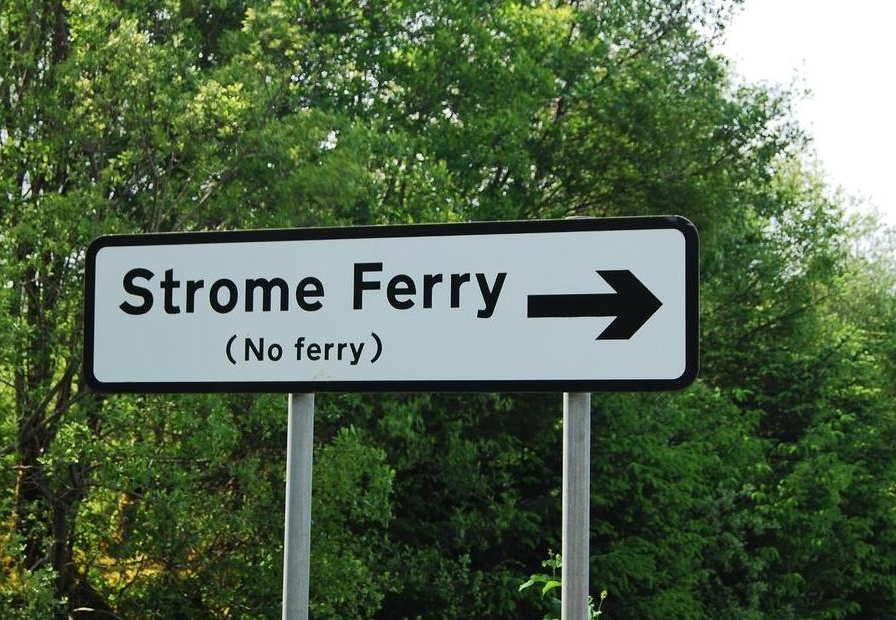
We arrive at the Carron River and all we have to do is use a sunny, albeit cold, afternoon to wash a few pieces of laundry and take a bath, even though the water is terribly icy. We hang large linen on the handlebars and luggage and head through the magical valley in the cool rays of the setting northern sun to the hills.
We pass children playing field hockey in beekeeping helmets. We draw dark water from a mountain spring, stop at a short distance behind the watershed at dusk, and build a shelter in the lee of the crumbling building. Flycatchers come together in flocks of the unprecedented, so it is almost impossible to make protein-free coffee. Our earlobes play in all colors, the purple tinge predominates. An interesting finding is that even if the flies find themselves in a tent, they do not bite in its monster. He makes up for it in the morning when we leave the tent until the cold morning.
At the crossroads at Achnasheen, we agree that our vacation is getting shorter and we will have to turn it around in order to catch the return bus at all. I still hope to persuade my partner on the next trip north, but I'm definitely giving up at the Gorstan crossroads. I have to be sensible. I have to be at work by the second week of September.
We'll head to Durmnadrochit, the center of the Loch Ness Monsters, and maybe we'll see one, in addition to the bronze one, lying in a small lake. In the film, I see a yacht circling the island under the ancient, legendary Urquhart Castle. We arrive in Inverness again almost in the dark. There will be nothing left to take pictures of, but a tour of the beautifully lit city is worth it.
We speculate that we have to travel back by train, so it's best to go out at night so we don't have to look for accommodation in the middle of the city. But hey. Trains do not run at night, the first until early in the morning. I remember that we passed the camp at the entrance to the city, so we return there.
Nobody at the reception, so we will pay in the morning. We quickly set up a tent, for the first time at a campsite during our stay in Britain, cook dinner and shower in warm water in a well-equipped washroom. We'll put the first train to sleep, never mind, we'll go the next. We make tea, eat something light and burn around the still closed reception at the station. We wanted to pay, but it didn't work.
At the station box office we learn that there is no room for bicycles on the train. Is it a shock how we get home? Lady, I have to go to work! The cashier suggests that we go and ask the train guide if there is a place. The guide is great. Let me go buy tickets (five minutes left until departure) and let's wait. The youngster in camouflage assures me that this train is good, there is enough space for bikes. The fact that there is room for just one round in other sets.
So I buy terribly expensive tickets to Carlisle (even though I have a VISA card) and hurry back to the platform. The conductor opens the luggage compartment door in the locomotive, ties the wheels and gets on the train, which starts immediately. Uff, it's nice, it's nice on the train.
We change in Edinburgh and, like seasoned Cossacks, we put our bikes on the train ourselves. This is perfectly normal here. We still have a long way to go from Carlisle to London, so right after the big purchase we set off to the Lake District, they say it's beautiful there. After a few hours, we lose each other when I hang myself as a mountain biker. Sometimes I do it so my veins don't get short. Other times I push Jarka, now she's rested, so she doesn't need it.
When I run away from her, somewhere, usually at the nearest intersection or at the top of a climb, I'll wait for her. That's why I stop at the nearest crossroads and bend over the map. It never occurred to me that my partner might overlook me. Well, in the end, after about an hour, we met happily. That was a joy. I don't know what she would do without money and documents and how I would explain to the police in my weak English that I lost my wife in two kilometers away.
We sleep on the shores of Lake Grasmere. The lake area is really beautiful, the lake poets knew what they were writing about. There's just a little too many people to our liking.
What's left. Unfortunately for us, the wind turned (The first law of cycling is relentless). A strong northwest wind blew all the way to the north and northwest, and at the end of our journey we found a stronger southeast wind. We really have to take it with us. We were a bit late around the lakes, so we have to take it at the very end after the main routes. In order to have at least a day left for London, we managed to get the boxes and pack the bikes in them. 150 km against the wind with a full load is not even fun for a trained cyclist.
We did it! Although with frayed ears. There was only an evening left for London, but beautiful. A friend, seventy-nine-year-old Jarda, who has lived in England for more than 30 years, has shown us a lot. He was probably a little jealous of us, he saw half the globe, but he wasn't on the Isle of Skye yet.
Only those sleeping bags should have been a little warmer.



